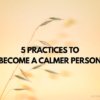
Do you ever find yourself saying, “I just have to get through this week…” and then that turns into every week? Well trust me, I’ve been there before.
Between work responsibilities, chores, and spending time with family and friends the calendar can really start to fill up quickly. And unfortunately, there was a time in my life where I let those activities push self care right off of my to-do list leaving me constantly feeling exhausted and burned out.
Before this experience, I always thought burnout was predominantly mental, not necessarily physical. But then I experienced a major wake up call.
Recognizing the signs of burnout
A couple of years ago, I was working long hours and then filling my hours after work with hobbies, chores, and spending time with my significant other. And then this constant mental drain and stress started to take a physical toll on my body.
I felt tired all of the time.
I had gained 10 pounds in a short amount of time. I was experiencing constant joint pain and headaches several times a week. Sometimes I would even get chest pain and a fever.
Naturally, these physical symptoms were alarming so I went to see my doctor. She heard my long list of symptoms and thought that I may have some kind of serious issue, so she sent me to get some bloodwork.
As I waited for the results, I felt nervous. The prospect of facing a serious health issue in the midst of all of the other overwhelm I was experiencing felt like it would be more than I could handle.
When I got the email notifying me that my test results had come in, I took a deep breath and opened it up.
Everything was all clear. At first, I felt confused. How could I feel so sick but nothing is wrong?
My diagnosis? Stress and burnout.
After talking it over with my doctor, we determined that my lack of time to relax was causing me to feel so burned out that I was feeling physical symptoms in addition to the mental symptoms.
When you are busy, you will likely be less in tune with what is happening with your body. Because of that, it’s important to be on the lookout for some major burnout symptoms. According to the Mayo Clinic, signs of burnout include:
- Feeling tired all of the time
- Feeling irritable and easy to anger
- Difficulty concentrating and being productive
- Lacking satisfaction in your personal achievements
- Feeling physically sick a lot (including headaches, stomach pain, etc.)
- Neglecting your health and self care
- Changes in your sleep habits
- Using food, alcohol, and drugs to cope
While there can be many causes of burnout, work is typically a large factor in why we are feeling so burned out. Familiarize yourself with some of the common causes of burnout to help you recognize the signs in the future before burnout sets in.
Common causes of burnout at work:
- Unmanageable workload
- Working long hours
- Unreasonable time pressure
- Lack of role clarity
- Unfair treatment
- Lack of support from colleagues and/or management
Overcoming burnout and finding relief through self care
After talking with my doctor about my test results, I felt a little stunned. How could I feel so physically sick because of stress and my mental health?
This felt like an important wake up call. I needed to change my lifestyle.
Previously, I would often turn to unhealthy ways of coping with stress like treating myself to fast food for dinner…every night.
I decided to tackle this issue head on and use self care to help myself recover from burnout and get back to being my normal, happy self.
As I started investing more time on self care, I started to feel more like myself again. I was feeling rested and those physical symptoms of burnout started to go away.
1. Take items off of your to-do list
Because burnout often stems from feeling overwhelmed by your schedule and how much you need to get done, I started by taking things off of my to-do list.
Downsizing my to-do list allowed me to set a more realistic schedule for myself, so I was able to lower my expectations on how much I should accomplish every day.
I learned to forgive myself for not completing everything on my to-do list. If you’re feeling burned out, be gentle with yourself if the quality and quantity of what you accomplish isn’t up to your usual standards.
Do not feel like you need to say yes to everything. It can be difficult to say no to people at first, but the more you do it the more comfortable you will feel with letting others know you don’t have the bandwidth to support them right now.
It’s also important to be realistic about your time frames and what you need to accomplish everyday. When you create your to-do list and schedule, also estimate how long it will take you to complete each task to avoid putting too much on your plate each day.
2. Take time to rest and relax
When you feel burned out, it is so important to give yourself space to rest and recover.
If you are feeling sick or experiencing physical pain from burnout, take time and care to treat these ailments.
It’s also important to mentally rest and recover. Instead of spending my down time watching TV or scrolling through social media, I dedicated myself to spending some quiet time relaxing.
Sleep is also really important in preventing burnout and exhaustion. If you find yourself cutting back on sleep to make room for items on your to-do list that tells you that you might be biting off a little more than you can chew.
3. Find the right self care activities for you
Self care activities help mentally decompress from the stressful impact your daily schedule has been having on your mind.
However, self care is not a one size fits all solution. What works for one person, will not necessarily be as effective for another person.
Because of that, it’s important to find the self care activities that make you feel relaxed and rested.
Some great self care activities for when you are feeling burned out include:
- Taking a nap
- Reading a book
- Lighting some candles
- Enjoying a warm cup of tea
- Taking a hot bath or shower
- Meditation
- Getting a massage
The key is finding self care activities that you enjoy and leave you feeling refreshed. Don’t choose activities that you might find mentally or physically draining if you are already burned out.
For example, if you are an introvert and find social situations draining, don’t choose self care activities that involve a lot of interaction with other people.
There is hope.
If you are feeling burned out, know that you are not alone and there will be a light at the end of the tunnel. Use these tips to guide your self care journey and reduce your feelings of burnout.
Working through feeling burned out can feel like an impossible challenge, but with a little patience, self care, and personal TLC you can find some relief.
 Erin Amborski is a self care blogger. In her blog, Self Care Seeker, Erin helps women through their self care journeys by writing about physical and mental health topics such as daily routines, stress management, personal growth, etc. In today’s world with life’s daily stresses, we could all use a little more self care. To embark on your own self care journey, check out https://www.selfcareseeker.com/ and subscribe to download free life changing self care resources: https://selfcareseeker.com/download-printable/
Erin Amborski is a self care blogger. In her blog, Self Care Seeker, Erin helps women through their self care journeys by writing about physical and mental health topics such as daily routines, stress management, personal growth, etc. In today’s world with life’s daily stresses, we could all use a little more self care. To embark on your own self care journey, check out https://www.selfcareseeker.com/ and subscribe to download free life changing self care resources: https://selfcareseeker.com/download-printable/






